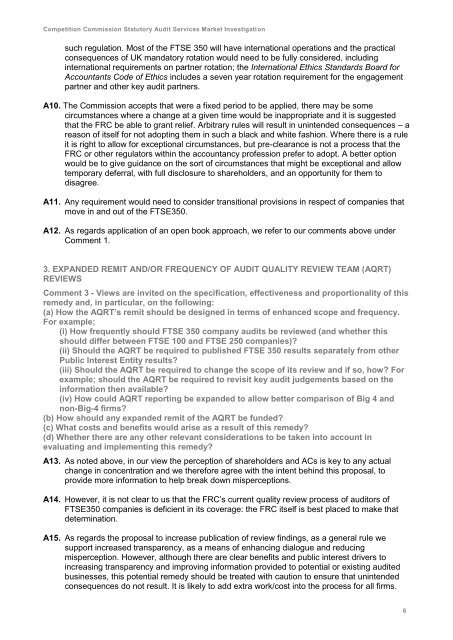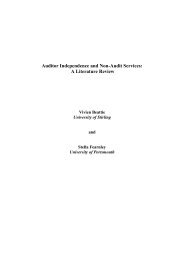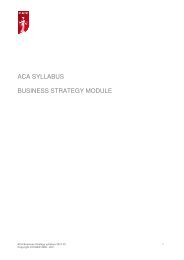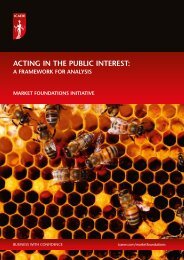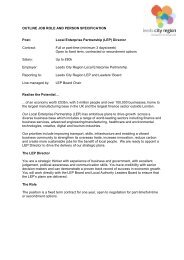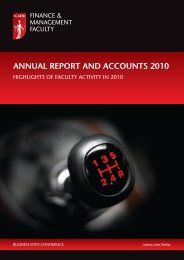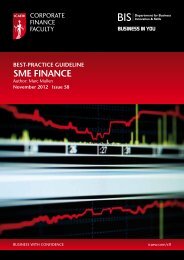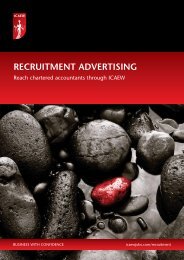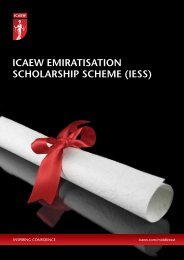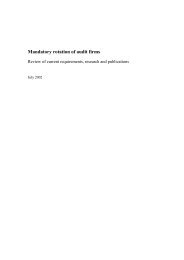ICAEW REP 46/13 Competition Commission Statutory Audit ...
ICAEW REP 46/13 Competition Commission Statutory Audit ...
ICAEW REP 46/13 Competition Commission Statutory Audit ...
Create successful ePaper yourself
Turn your PDF publications into a flip-book with our unique Google optimized e-Paper software.
<strong>Competition</strong> <strong>Commission</strong> <strong>Statutory</strong> <strong>Audit</strong> Services Market Investigationsuch regulation. Most of the FTSE 350 will have international operations and the practicalconsequences of UK mandatory rotation would need to be fully considered, includinginternational requirements on partner rotation; the International Ethics Standards Board forAccountants Code of Ethics includes a seven year rotation requirement for the engagementpartner and other key audit partners.A10. The <strong>Commission</strong> accepts that were a fixed period to be applied, there may be somecircumstances where a change at a given time would be inappropriate and it is suggestedthat the FRC be able to grant relief. Arbitrary rules will result in unintended consequences – areason of itself for not adopting them in such a black and white fashion. Where there is a ruleit is right to allow for exceptional circumstances, but pre-clearance is not a process that theFRC or other regulators within the accountancy profession prefer to adopt. A better optionwould be to give guidance on the sort of circumstances that might be exceptional and allowtemporary deferral, with full disclosure to shareholders, and an opportunity for them todisagree.A11. Any requirement would need to consider transitional provisions in respect of companies thatmove in and out of the FTSE350.A12. As regards application of an open book approach, we refer to our comments above underComment 1.3. EXPANDED REMIT AND/OR FREQUENCY OF AUDIT QUALITY REVIEW TEAM (AQRT)REVIEWSComment 3 - Views are invited on the specification, effectiveness and proportionality of thisremedy and, in particular, on the following:(a) How the AQRT’s remit should be designed in terms of enhanced scope and frequency.For example;(i) How frequently should FTSE 350 company audits be reviewed (and whether thisshould differ between FTSE 100 and FTSE 250 companies)?(ii) Should the AQRT be required to published FTSE 350 results separately from otherPublic Interest Entity results?(iii) Should the AQRT be required to change the scope of its review and if so, how? Forexample; should the AQRT be required to revisit key audit judgements based on theinformation then available?(iv) How could AQRT reporting be expanded to allow better comparison of Big 4 andnon-Big-4 firms?(b) How should any expanded remit of the AQRT be funded?(c) What costs and benefits would arise as a result of this remedy?(d) Whether there are any other relevant considerations to be taken into account inevaluating and implementing this remedy?A<strong>13</strong>. As noted above, in our view the perception of shareholders and ACs is key to any actualchange in concentration and we therefore agree with the intent behind this proposal, toprovide more information to help break down misperceptions.A14. However, it is not clear to us that the FRC’s current quality review process of auditors ofFTSE350 companies is deficient in its coverage: the FRC itself is best placed to make thatdetermination.A15. As regards the proposal to increase publication of review findings, as a general rule wesupport increased transparency, as a means of enhancing dialogue and reducingmisperception. However, although there are clear benefits and public interest drivers toincreasing transparency and improving information provided to potential or existing auditedbusinesses, this potential remedy should be treated with caution to ensure that unintendedconsequences do not result. It is likely to add extra work/cost into the process for all firms.6


